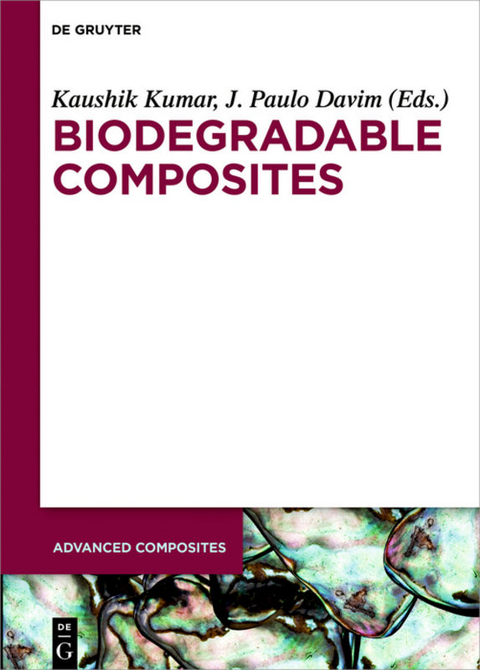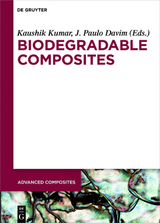Biodegradable Composites
Materials, Manufacturing and Engineering
Seiten
Composite materials are engineered materials, made from two or more constituents with significantly different physical or chemical properties which remain separate on a macroscopic level within the finished structure. Due to their special mechanical and physical properties they have the potential to replace conventional materials.
Composite materials are defined as "engineered materials made from two or more constituent materials with significantly different physical or chemical properties which remain separate and distinct on a macroscopic level within the finished structure". Recently, the utilization of composites has increased in various areas of science and engineering due to their special mechanical and physical properties. Therefore, composites have the potential to replace conventional materials in various fields of application such as automotive, biomedical, aeronautical and aerospace as well as in others advanced industries. Recently, advanced composites, for example, nanocomposites and biocomposites had been gaining ground for the development of new products in several industries. The goal of Advanced Composites is the combined presentation of materials, manufacturing technology and engineering aspects of composites. This Series covers the complete range of multi scale composite materials, including nanocomposites, biocomposites, functional and smart composites, structural composites, gradient and layered composites, eco-composites, composites based in natural materials, etc. Current topics of interest include the physical and chemical properties, microstructural characterization of composites, design and manufacture of composites and structures, mechanical behaviour in use environments, testing and characterisation techniques, modelling and optimization methods, fracture, creep, tribology, machinability and performance of composites in service. Advanced Composites is essential reference for academics, materials, physics, chemical researchers, mechanical and materials, biomedical engineers, professionals in composite-related industries.
Composite materials are defined as "engineered materials made from two or more constituent materials with significantly different physical or chemical properties which remain separate and distinct on a macroscopic level within the finished structure". Recently, the utilization of composites has increased in various areas of science and engineering due to their special mechanical and physical properties. Therefore, composites have the potential to replace conventional materials in various fields of application such as automotive, biomedical, aeronautical and aerospace as well as in others advanced industries. Recently, advanced composites, for example, nanocomposites and biocomposites had been gaining ground for the development of new products in several industries. The goal of Advanced Composites is the combined presentation of materials, manufacturing technology and engineering aspects of composites. This Series covers the complete range of multi scale composite materials, including nanocomposites, biocomposites, functional and smart composites, structural composites, gradient and layered composites, eco-composites, composites based in natural materials, etc. Current topics of interest include the physical and chemical properties, microstructural characterization of composites, design and manufacture of composites and structures, mechanical behaviour in use environments, testing and characterisation techniques, modelling and optimization methods, fracture, creep, tribology, machinability and performance of composites in service. Advanced Composites is essential reference for academics, materials, physics, chemical researchers, mechanical and materials, biomedical engineers, professionals in composite-related industries.
Kaushik Kumar, Birla Institute of Technology, Ranchi, India. J. Paulo Davim, University of Aveiro, Aveiro, Portugal.
| Erscheinungsdatum | 07.05.2019 |
|---|---|
| Reihe/Serie | Advanced Composites ; 10 |
| Zusatzinfo | 22 b/w and 28 col. ill., 23 b/w tbl. |
| Verlagsort | Berlin/Boston |
| Sprache | englisch |
| Maße | 170 x 240 mm |
| Gewicht | 544 g |
| Themenwelt | Technik ► Umwelttechnik / Biotechnologie |
| Schlagworte | Biodegradability • biologische Abbaubarkeit • Chemische Technik • Composite Materials. • fuer • Kunstwissenschaft • Materials Science • Physics • Polymer • Polymer Science and Technology • Repertorium • Science • TECHNOLOGY & ENGINEERING • Textiles & Polymers • Verbundwerkstoff |
| ISBN-10 | 3-11-060203-2 / 3110602032 |
| ISBN-13 | 978-3-11-060203-6 / 9783110602036 |
| Zustand | Neuware |
| Informationen gemäß Produktsicherheitsverordnung (GPSR) | |
| Haben Sie eine Frage zum Produkt? |
Mehr entdecken
aus dem Bereich
aus dem Bereich
Kommentar der DIN 15905-5, LärmVibrationsArbSchV und …
Buch | Softcover (2023)
DIN Media (Verlag)
58,00 €
Buch | Softcover (2023)
DIN Media (Verlag)
75,40 €
Buch | Softcover (2024)
Pearson Education Limited (Verlag)
75,95 €




